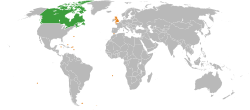This is an old revision of this page, as edited by 24.192.6.19 (talk) at 00:18, 12 October 2012. The present address (URL) is a permanent link to this revision, which may differ significantly from the current revision.
Revision as of 00:18, 12 October 2012 by 24.192.6.19 (talk)(diff) ← Previous revision | Latest revision (diff) | Newer revision → (diff) Bilateral relations | |
Canada |
United Kingdom |
|---|---|
British–Canadian relations (also called Canada – United Kingdom relations)Cite error: A <ref> tag is missing the closing </ref> (see the help page).
In bottom-line terms, two-way merchandise trade between Canada and the UK reached almost C$21 billion in 2006, with two-way investment stocks totaling C$98 billion. The UK accounted for C$10.1 billion of exports from Canada, with gold, uranium and nickel – together with higher exports of aircraft and telecommunications equipment – sitting high on the list. The UK ranks second in Foreign Direct Investment (FDI) in Canada, valued at C$39 billion in 2006, up 29.9 per cent on the previous year. The UK is also the second largest destination of Canadian direct investment abroad, valued at C$59 billion (11.3 per cent of the global total), up 20.7 per cent on 2005, positioning Canada as the third largest investor in the UK, following the US and France.
On 9 February 2011, the boards of the London Stock Exchange and the Toronto Stock Exchange agreed to a deal in which both holding companies for the stock exchanges would merge, creating a leading exchange group with the largest number of listed companies in the world, and a combined market capitalisation of £3.7 trillion (C$5.8 trillion). The merged was ultimately cancelled on 29 June 2011 when it became obvious TMX shareholders would not give the needed two-thirds approval.
Tourism
In 2004, about 800,000 British residents visited Canada, making the United Kingdom Canada's second-largest source of tourists after the United States. That same year, UK visitors spent almost C$1 billion while visiting Canada. Britain was the third most-popular international destination for Canadian tourists in 2003, after the United States and Mexico – with some 700,000 visitors spending over C$800 million.
Defence and security
See also: Canada's role in the invasion of Afghanistan, Britain's role in the 2001-present Afghan war, and Libyan no-fly zoneBoth countries are members of NATO. Before 2011, the two countries' main areas of defence cooperation was in Afghanistan, where both were involved in the dangerous southern provinces, however Canada has since withdrawn. However, both have provided air power to the NATO-led mission over Libya.
Migration
Further information: History of immigration to Canada, English-Canadian, Scottish Canadian, Welsh Canadian, and Canadians in the United KingdomFrom the conquest of New France until 1966, Britain remained one of Canada's largest sources of immigrants, usually the largest. Since 1967, when Canadian laws were changed to remove preferences that had been given to Britons and other Europeans, British migration to Canada has continued at a lower level. When the constituent nations of the UK (England, Wales, Scotland, and Northern Ireland) are taken together, people of British ancestry still form Canada's largest ethnic group.
Historically, Canadians have travelled to Britain to advance their careers or studies to higher levels than could be done at home. Britain acted as the metropole, or centre, to which Canadians gravitated; this function has to a large extent been reduced as the Canadian economy and institutions have developed.
Quotes
- Canada's future first prime minister, Sir John A. Macdonald, speaking in 1865, hoped that, if the Canadian colonies created a new federation, then Britain and Canada would have "a healthy and cordial alliance. Instead of looking upon us as a merely dependent colony, England will have in us a friendly nation, a subordinate but still a powerful people to stand by her in North America in peace or in war."
- Speaking many years later at the beginning of the 1891 election (fought mostly over Canadian free trade with the United States), Macdonald said on February 3, 1891: "As for myself, my course is clear. A British subject I was born; a British subject I will die. With my utmost effort, with my latest breath, will I oppose the ‘veiled treason’ which attempts, by sordid means and mercenary proffers, to lure our people from their allegiance."
See also
- High Commission of Canada in London
- High Commission of the United Kingdom in Ottawa
- List of High Commissioners from the United Kingdom to Canada
- List of Canadian High Commissioners to the United Kingdom
References
- ^ http://www.international.gc.ca/canada-europa/united_kingdom/can_UK-en.asp Canadian High Commission in London Cite error: The named reference "canlondon" was defined multiple times with different content (see the help page).
- http://www.thestar.com/business/article/1016709--toronto-london-stock-exchange-merger-terminated
- Foreign Affairs and International Trade Canada – Canada and the World: A History – 1867 – 1896: Forging a Nation
- Histor!ca "Election of 1891: A Question of Loyalty", James Marsh.
| Foreign relations of Canada | |||||||||||||||||
|---|---|---|---|---|---|---|---|---|---|---|---|---|---|---|---|---|---|
| |||||||||||||||||
| |||||||||||||||||
| |||||||||||||||||
External links
- Government
- Visit Britain the British Tourist Board's Canadian site
- British High Commission The British High Commission in Ottawa
- Canadian High Commission Canadian High Commission in London